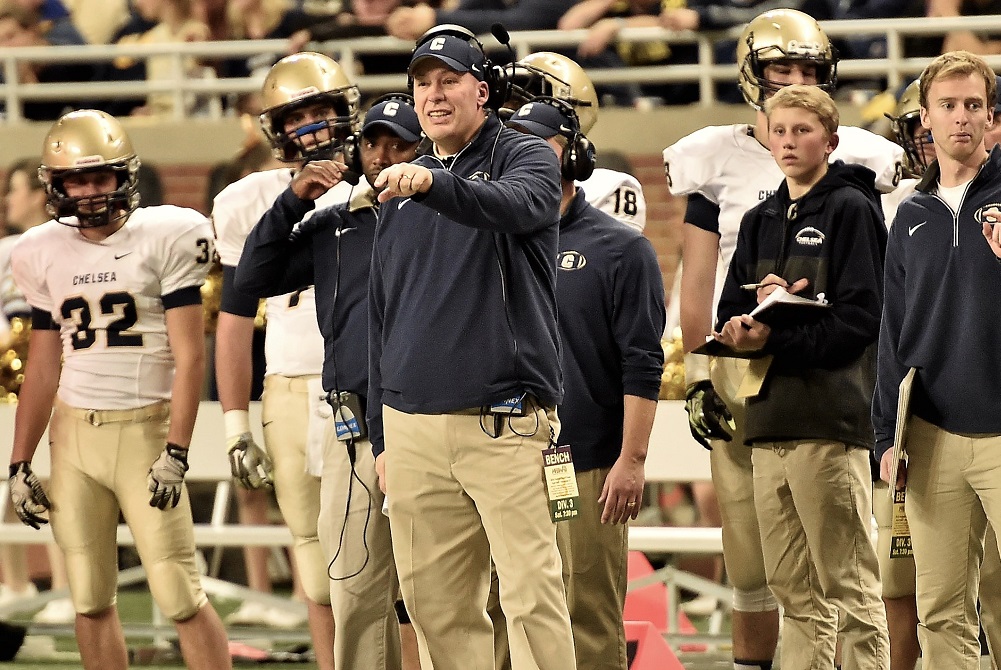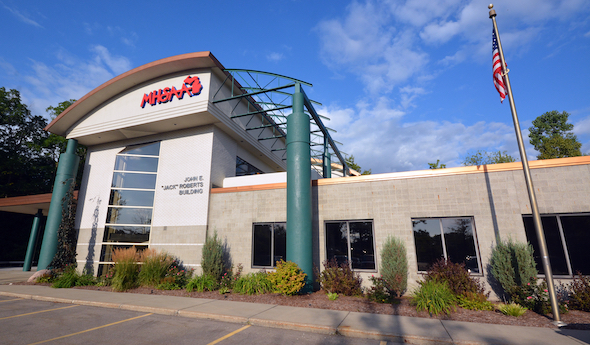
Longtime Chelsea High School Administrator, Coach Bush to Join MHSAA Staff as Assistant Director
By
Geoff Kimmerly
MHSAA.com senior editor
December 21, 2022
Brad Bush, a highly-respected educator, administrator and coach over the last three decades, has been selected to serve in the position of assistant director for the Michigan High School Athletic Association, beginning Jan. 17.
 Bush, 52, taught and coached at East Kentwood High School for four years before beginning a tenure at Chelsea High School in 1997 that has included teaching, then serving as athletic director and later also assistant principal and leading the football program as varsity coach from 1997-2002 and again from 2004-18.
Bush, 52, taught and coached at East Kentwood High School for four years before beginning a tenure at Chelsea High School in 1997 that has included teaching, then serving as athletic director and later also assistant principal and leading the football program as varsity coach from 1997-2002 and again from 2004-18.
He also has served as a statewide delegate on the MHSAA Representative Council during the last year and provided leadership in multiple roles, including president, for the Michigan High School Football Coaches Association (MHSFCA) since 2005.
Bush will serve as the MHSAA’s lead administrator for baseball and also among lead administrators for the officials program, which includes more than 8,000 registered officials in all sports. Bush also will be assigned additional duties in other sports based on his vast experiences. He was selected from a pool of 34 applicants.
“I’m incredibly excited to have Brad join our team,” MHSAA Executive Director Mark Uyl said. "He’s been an outstanding athletic director and coach who is highly-respected by those who know him.”
As Chelsea athletic director, Bush annually has supervised a staff of 110 coaches across 31 programs, with nearly 70 percent of the high school’s 800 students participating in athletics. As a teacher and assistant principal, he has served on Chelsea’s School Improvement Team and on multiple committees that provided instructional leadership including in the development of the district’s new trimester schedule. In his roles with the MHSFCA, Bush helped direct an organization with more than 2,200 members and also served as the association’s treasurer and liaison to the MHSAA.
Bush is perhaps best known, however, for his coaching success. Over 22 seasons, he led Chelsea’s varsity football team to a 169-60 record, 13 league championships, 18 playoff appearances, seven District titles and a Division 3 runner-up finish in 2015. During his break in tenure as Chelsea coach, Bush served as an assistant football coach and recruiting coordinator for Eastern Michigan University during the 2003-04 school year, and he has served as an assistant coach at Albion College the last four seasons contributing to the team’s two league titles and appearance in the 2021 NCAA Division III Playoffs.
“I feel like joining the team at the MHSAA is an opportunity I couldn’t pass up,” Bush said. “The 26 years I spent at Chelsea were some of the best times of my life. It’s a professional transition that in the back of my mind, if this opportunity came, was something I needed to do.
“Over time, I’ve grown to care about the bigger picture of athletics and appreciate the role of the MHSAA in protecting high school athletics in Michigan.”
Bush is a 1988 graduate of Ypsilanti High School. He studied and played quarterback at Cornell University before returning and graduating from EMU after majoring in history and minoring in social studies. He earned his physical education endorsement from EMU in 2000 and his master’s in physical education and sports management from EMU in 2002. He has earned continuing education credits in sports management from Drake University and completed the Path to Leadership program from the Michigan Association of Secondary School Principals (MASSP).
Bush was inducted into MHSFCA Hall of Fame and Ypsilanti High School Hall of Fame both in 2019. He and his wife Laura have three adult children, two daughters and a son.
PHOTO Chelsea coach Brad Bush directs his team during the 2015 Division 3 Final at Ford Field.

From the Director: Back to School
August 7, 2020
By Mark Uyl
MHSAA Executive Director
Since March 12, our world has been anything but normal. These times have tested most everything in life, and as summer turns toward fall, we find ourselves still with far more questions than answers. It has been said that an abnormal reaction to an abnormal situation is normal behavior.
Let me start with these abnormal times. I’ve had many conversations with administrators over the past month about the start of school and school sports. The one constant theme is these are anything but normal times. Many of these conversations have moved to the issue of schools starting the academic year virtually while considering whether or not to offer school sports opportunities this fall. Let me share the things that have been part of almost all conversations on this topic.
The loudest message I hear is kids are going to be playing sports this fall someplace. Period. If we believe that kids are going to take the fall off if school sports aren’t offered, we haven’t been paying much attention since May. Since that time, athletic activity has taken place in the club, travel, AAU and non-school space nearly every day. From first-hand experience, many of these events have implemented ZERO of the safety standards and protocols that businesses and schools have adopted for their plans of return. The non-school world generally has plowed ahead this summer with few-to-no rules, regulations, enforcement, oversight and accountability to anyone. If kids are going to be playing sports, our member schools are telling us that activity needs to be in the safest environment possible – which is with professional educators and trained coaches in our school sports world.
Schools are quick to point out that kids have been conditioning and training with school coaches in school-sponsored workouts most of the summer. We believe that the absence of virus outbreaks among our 749 high schools’ summer activities, involving thousands of kids, has been because schools have been following the return-to-activity plans. Districts have told us they can continue doing what they’ve been doing safely since June by following all COVID guidance and regulations we have put in place with government’s leadership and partnership.
Schools starting the year virtually are telling us they will use the lessons learned from the start of sports for when students return to campus later in the fall. School administrators have shared this view privately as this has become a highly-charged topic among various groups within our school communities. Sports allow schools to bring students back to campus in small, consistent and defined groups with the same adults working with those students each day. In school sports, there is little mixing of students from one sport with those students in another – making it much easier to monitor, track and trace kids when needed than if all students were in the buildings, hallways and classrooms all day. We hear from administrators that valuable lessons can be learned with athletics in August and September for a successful school start-up with students back on campus in October.
All of us share the fundamental belief that we must protect the health and safety of individuals first. This doesn’t include only COVID prevention measures, but also the mental health of teenage students and adults as well. In districts that are starting the school year online, they see athletics being the one shred of normalcy students, and staff members who choose to coach, will have during the fall. It’s a chance to safely interact with peers and get needed physical activity that hasn’t been happening for some kids since March. Health and safety has to include all facets of the individual, and more research is being shared each day about how mental health is becoming a critical issue. For many at-risk kids, sports is the one motivating factor to keep them in school and progressing toward graduation. Given the challenges of all online education for these at-risk kids, sports and the daily routine they bring perhaps would be more important for this group of students than ever before.
With no school sports, the affluent communities and families can navigate online learning during the day and then afford the non-school athletic opportunities that kids and families in less-affluent areas simply cannot. In many communities, school sports can provide opportunities and open doors that would not appear if kids become priced-out from participating and competing.
The past five months have been the most abnormal in a century. School sports being the one pathway back to school for students in our state – the one norm for this fall – run by professional educators who put kids first, would be an incredible boost to the physical and mental health of all of us. We believe that school sports can be done safely and smartly, and the MHSAA has developed plans that do just that. While the optics of sports taking place while waiting for in-person education is not what any of us prefer, we believe we must react to these abnormal times by thinking differently and looking at these unique times through a unique lens.
Trying to find one normal for our kids in these abnormal school days might just be the best thing we can do.

